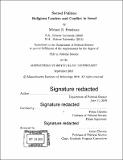| dc.contributor.advisor | Fotini Christia, Richard Nielsen, and Guy Grossman. | en_US |
| dc.contributor.author | Freedman, Michael R.(Michael Raphael) | en_US |
| dc.contributor.other | Massachusetts Institute of Technology. Department of Political Science. | en_US |
| dc.coverage.spatial | a-is--- | en_US |
| dc.date.accessioned | 2020-03-24T15:37:31Z | |
| dc.date.available | 2020-03-24T15:37:31Z | |
| dc.date.copyright | 2019 | en_US |
| dc.date.issued | 2019 | en_US |
| dc.identifier.uri | https://hdl.handle.net/1721.1/124275 | |
| dc.description | Thesis: Ph. D., Massachusetts Institute of Technology, Department of Political Science, 2019 | en_US |
| dc.description | Cataloged from PDF version of thesis. | en_US |
| dc.description | Includes bibliographical references (pages 165-176). | en_US |
| dc.description.abstract | My dissertation examines why religious leaders adopt nationalist positions and how these positions contribute to the duration of an ongoing conflict. I propose a general framework of sacred politics that incorporates the state, religious leaders, and religious communities. Within this framework, I develop a theory of religious credibility that explains the variation in religious leader ideology through examining leaders' incentives to strategically adopt ideological positions and the network of religious institutions. I test these hypotheses in Israel using a combination of methods including statistical text methods that analyze religious communication of different religious leaders, spatial panel data showing the electoral impact of religious institutions, and a novel experimental design where I vary the credibility of religious leaders using religious sermons. This dissertation offers significant social science contributions as it offers an account of why religious leaders adopt moderate and extreme ideologies. They also give insight into the reasons why some religious leaders cooperate with the state, why this cooperation is crucial for the termination of conflict, and the influence that religious leaders have on the political behavior of their followers. Outside of scholarly literatures, the dissertation offers important findings for policy-makers seeking to understand and include religious leaders in development and peace-building processes. | en_US |
| dc.description.statementofresponsibility | by Michael R. Freedman. | en_US |
| dc.format.extent | 176 pages | en_US |
| dc.language.iso | eng | en_US |
| dc.publisher | Massachusetts Institute of Technology | en_US |
| dc.rights | MIT theses are protected by copyright. They may be viewed, downloaded, or printed from this source but further reproduction or distribution in any format is prohibited without written permission. | en_US |
| dc.rights.uri | http://dspace.mit.edu/handle/1721.1/7582 | en_US |
| dc.subject | Political Science. | en_US |
| dc.title | Sacred politics : religious leaders and conflict in Israel | en_US |
| dc.title.alternative | Religious leaders and conflict in Israel | en_US |
| dc.type | Thesis | en_US |
| dc.description.degree | Ph. D. | en_US |
| dc.contributor.department | Massachusetts Institute of Technology. Department of Political Science | en_US |
| dc.identifier.oclc | 1144176792 | en_US |
| dc.description.collection | Ph.D. Massachusetts Institute of Technology, Department of Political Science | en_US |
| dspace.imported | 2020-03-24T15:37:29Z | en_US |
| mit.thesis.degree | Doctoral | en_US |
| mit.thesis.department | PoliSci | en_US |
